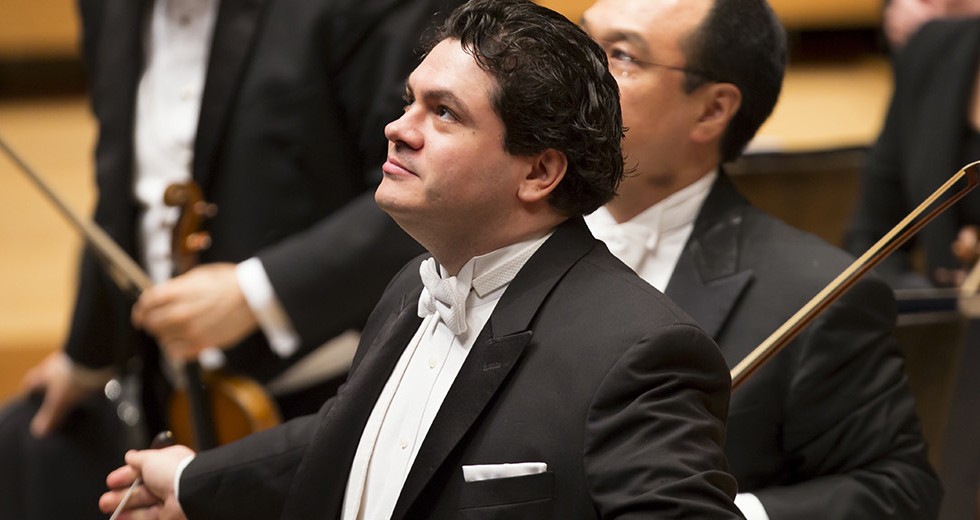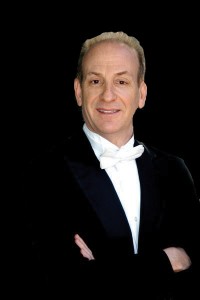
Now 89, Sir Neville Marriner believes what’s hardest about becoming a geriatric conductor is how demand for public appearances increases, rather than wanes. Romanian-born conductor Cristian Macelaru, 33, made his professional debut in 2010, launching a career that promises to put the Englishman’s cheeky lament to the test. A former concertmaster, Macelaru is now associate conductor of the esteemed Philadelphia Orchestra, and he’s now approaching his fifth stint in two years conducting the Chicago Symphony Orchestra, including two engagements here Feb. 8 and Feb. 20-25. The young maestro is keeping his agent happy.
Quickly, Macelaru learned that conductors cannot be creatures of routine. About his European debut with the Gothenburg Symphony Orchestra in September, he admits: “I literally found out on Saturday afternoon, flew to Sweden on Sunday for a Monday rehearsal, and then gave performances on Wednesday and Thursday.” In addition to the emergency travel arrangements, Macelaru had only a few hours to learn two new scores: Lieberson’s “Neruda Songs” and Andrea Tarrodi’s “Camelopardalis,” the latter totally unfamiliar to him.
“It’s hard to get a game plan in a situation like that,” he says, laughing, in an interview from his home in Philadelphia. “But it’s a very exciting and challenging thing to do — it’s what is expected in this career.”
Macelaru began his CSO relationship under similarly last-minute circumstances. When the CSO’s multimedia Beyond the Score headed east to Philadelphia, Macelaru filled in to conduct for an ailing Charles Dutoit. There, Macelaru and Gerard McBurney, CSO programming and artistic adviser (and creative director of Beyond the Score) hit it off, and McBurney suggested the two collaborate in Chicago. A few months later, Macelaru conducted a MusicNOW concert and developed a lasting rapport with CSO musicians.
The phone rang again, and soon Macelaru was filling in for Pierre Boulez, whose Beyond the Score concerts that season were to feature a few 20th century touchstones: Schoenberg’s Pierrot Lunaire and Stravinsky’s The Soldier’s Tale. Local critics praised the impromptu substitution, calling Macelaru’s performance “superb,” “expertly realized” and “finely detailed.”
Macelaru, the youngest of 10 musical siblings, sounds as if he’s glowing when he talks about his encounter with Boulez at Orchestra Hall. “It was the time of my life. He has such a spectacular, unbelievable mind,” he says, pausing to find more words. “His comments made my performance that much better.” Since then, the CSO has regularly targeted Macelaru as a replacement. Last March he filled in again for an ailing Boulez. And Macelaru will replace his CSO mentor once more when he takes the podium for a Boulez-curated program of Stravinsky, Debussy and Ravel works Feb. 20-25 with the CSO. (He also will conduct two performances Feb. 8 of “Alien Invasion: Orchestra From Planet X,” in the CSO Family Matinee Series. Then he will return in June for the CSO’s residency at the Morton Arboretum, conducting works by Mendelssohn, Tchaikovsky and Beethoven on June 27, and Brahms, Bruch and Dvorak on June 28.)
Macelaru’s rise through the ranks at one of America’s most esteemed orchestras makes it all the more surprising he didn’t start conducting sooner. At 17 years old, the fresh-faced native of Timisoara traveled to northern Michigan to play violin at the renowned Interlochen camp, and there played Shostakovich’s Symphony No. 11 under conductor Larry Rachleff (below left), now music director emeritus of the Chicago Philharmonic. As concertmaster, Macelaru proved a budding star of the violin, but he left Interlochen that summer with a new goal in mind.
 “Larry is, more or less, the reason why I became a conductor,” Macelaru says. “I got interested in the craft because of how inspiring he was to me.”
“Larry is, more or less, the reason why I became a conductor,” Macelaru says. “I got interested in the craft because of how inspiring he was to me.”
When the two started talking incessantly about music in off hours, the young musician asked Rachleff if he could apprentice under him. The veteran conductor agreed, but not without a stipulation. “When you’re ready and want to conduct, call me,” he said. “But you first have to study violin as much as you can.” Macelaru agreed, completing his bachelor of music in violin performance at the University of Miami in Coral Cables. He was 26 years old and had still not touched a baton, but wanted so much to conduct that he was happy to wait.
“When I finished my bachelor’s in violin and then my master’s in violin, I sought out Larry and said, “Here I am. You promised me!””
Rachleff held a spot for Macelaru in the conducting program at Rice University in Houston. The pupil seized every chance to learn from him, so that two years of active study felt more like “eight or nine years” of education. In 2008, he finished his master’s degree in conducting, and just two years later Macelaru was leading orchestras at the Dallas Opera and Pittsburgh Symphony.
“I owe Larry a whole lot, and I love him dearly,” he says.
Rachleff, now in his 23rd year of teaching at Rice, modestly downplays his student’s praise. He argues that his protégé’s chops as a superb violinist has helped him become the successful conductor he is now.
“Cristi is more than a triple threat,” says Rachleff from his home in Texas of Macelaru’s skills as a violinist, conductor, and yes, composer. “He was always destined to do important things, and while those things weren’t always clear early on, his cultural sensibility and incredible ear were always going to serve him well. When you run across people like that, you endeavor not to get in their way.
“You know, success is a funny thing,” Rachleff adds. “You always want to make sure that people become successful, but that they hang on to the purity of the 17-year-old. I wish that for Cristi, of course.”
Rachleff clearly admires Macelaru not only for his rare talents, but for his kindness as well.
Meanwhile, Macelaru is grateful to be coming of age in Philadelphia, where he respectfully honors those who now surround him and fuel his talents. “Every hour I’m on the podium with those musicians,” he says, “I feel like I mature one year.”
Bryant Manning is a Texas-based free-lance writer.





